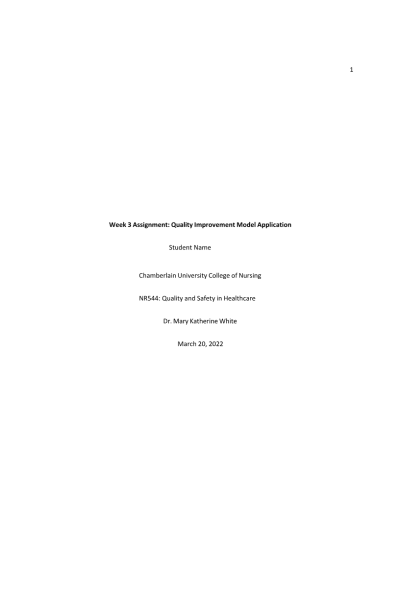NR 544 Week 3 Assignment; Quality Improvement Model Application - Medication Administration Errors (MAEs)
-
$20.00
| Institution | NR 544 Quality and Safety Core Elective |
| Contributor | Abarca |
Medication Administration Errors (MAEs)
Medication administration errors (MAEs) are a significant patient safety issue. MAEs are thought of as a failure in one of the five rights of medication administration (right patient, medication, time, dose, and route). The “five rights” have been incorporated into the nursing curriculum as the standard process to ensure safe medication administration (MacDowell et al., 2021). “MAEs are the leading cause of patient harm within the healthcare system, and pose dangerous risks and consequences to patients, healthcare workers, and healthcare organizations” (Wondmieneh et al., 2020). Within this paper, I plan to discuss the effects of MAEs have on patients, healthcare workers, and healthcare organizations as well as identify goals for improvement, analyze patient safety concerns utilizing a quality philosophy, identify current evidence-based practice surrounding the issue, and outline interventions and quality improvement tools that can be unutilized to avoid this issue regarding case management nursing practices.
Background and Scope of Problem
MAEs are a result of unsafe medication practices that can occur at any stage of the medication administration process (prescribing, transcribing, dispensing, and administering). Medication errors are the most common type of medical errors that occur in hospitals, and in USA it is the eighth leading cause of death higher than car accidents, breast cancer, and AIDS combined. “The most frequently occurring MAEs include incorrect dose, incorrect time, incorrect drug, incorrect route, incorrect patient, lack of documentation, and omission of doses” (Wondmieneh et al., 2020). The administration of medications is primarily the nurse’s responsibility as they represent the last safety check in the chain of events in the medication administration process as well as being the last safeguard of the patient’s wellbeing. MAEs have proven to be costly to patients, families, employers, hospitals, healthcare providers, and insurance companies. Also, nurses who are involved in MAEs were found to suffer from emotional distress, lack of confidence, and punitive actions, especially when the error resulted in patient harm. (Wondemieneh et al., 2020). The case manager is to contribute to the safety of the therapeutic environment to achieve excellent patient outcomes by implementing strategies to assist in designing safe medication administration practices................... Continue
| Instituition / Term | |
| Term | Year 2022 |
| Institution | NR 544 Quality and Safety Core Elective |
| Contributor | Abarca |



















